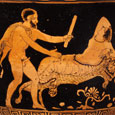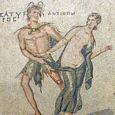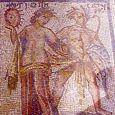ANTIOPE
Greek Name
Αντιοπη
Transliteration
Antiopê
Latin Spelling
Antiope
Translation
Eyes-Turned? (anti-, ops)
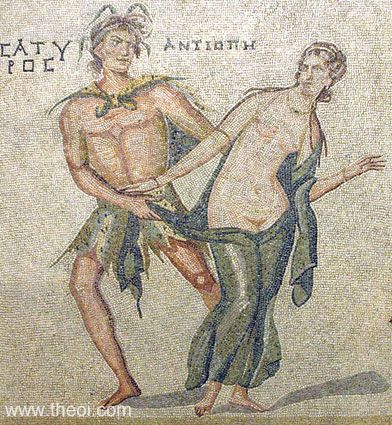
ANTIOPE was a princess of the Boiotian town of Hyria. She was a daughter of the lord Nykteus (Nycteus), though some claimed her real father was the river Asopos.
Antiope was loved by the god Zeus who seduced her in the guise of a satyr on Mount Kithairon (Cithaeron). When Nykteus discovered she was pregant, he threatened her, and she fled to find refuge with King Epopeus of Sikyon. Nykteus then killed himself in shame and called upon his brother Lykos (Lycus) to avenge him.
Lykos had since been appointed regent of the powerful Boiotian town of Thebes. Its former king, Labdakos (Labdacus), had died young leaving a child on the throne. With the city-state's army he laid siege to Sikyon, slew Epopeus and dragged Antiope away. On the return trip to Thebes she gave birth to twin sons--Amphion and Zethos (Zethus)--which were exposed to die on Mount Kithairon near Eleutherai. However shepherds came across the infants and raised them as their own. The boys were instructed by the god Hermes in various arts with Amphion becoming a skilled bard and his brother Zethos a cattle-herder.
Antiope was treated badly by Lykos' wife Dirke (Dirce) who kept her as little more than a slave. When she learned that her sons were alive and grown, she fled Thebes and called upon them to avenge her. The twins captured Dirke as she was celebrating the rites of Dionysos on Mount Kithairon and tied her to a bull which tore her apart. They then slew King Lykos and seized the throne of Thebes. The god Dionysos, however, was offended by the death of his devotee and drove Antiope mad. She roamed across the hills to the neighbouring kingdom of Phokis (Phocis) where King Phokos (Phocus) found her, cured her of her illness, and made her his wife.
Antiope and her sons, Amphion and Zethos, were later honoured as heroes at Thebes. Unlike most heroes however--which produced long lines of descendants--their house was cut short by the untimely deaths of the twins and their children. Some say that one of the daughters, Khloris (Chloris), survived, and that she became the mother of the Trojan War hero Nestor.
FAMILY OF ANTIOPE
PARENTS
[1.1] ASOPOS (Homer Odyssey 11.260, Apollonius Rhodius 1.735, Pausanias 2.6.1)
[2.1] NYKTEUS & POLYXO (Apollodorus 3.41 & 3.111)
[2.2] NYKTEUS (Pausanias 2.6.1, Apollonius Rhodius 4.1090, Clement Recognitions 10.22, Hyginus Fabulae 7 & 8, Ovid Metamorphoses 6.111, Statius Thebaid 7.191)
OFFSPRING
[1.1] AMPHION & ZETHOS (by Zeus) (Homer Odyssey 11.260, Asius Fragment, Apollonius Rhoidus 1.735, Apollodorus 3.41 & 3.111, Pausanias 2.6.4, Clement Recognitions 10.22, Hyginus Fabulae 7 & 8)
ENCYCLOPEDIA
ANTIOPE (Antiopê), a daughter of Nycteus and Polyxo (Apollod. iii. 5. § 5, 10. § 1), or of the river god Asopus in Boeotia. (Odyss. xi. 260; Apollon. Rhod. i. 735.) She became by Zeus the mother of Amphion and Zethus. When Antiope was with child by the father of the gods, fear of her own father induced her to flee to Epopeus at Sicyon, whom she married. Nycteus killed himself in despair, but charged his brother Lycus to avenge him on Epopeus and Antiope. Lycus accordingly marched againt Sicyon, took the town, slew Epopeus, and carried Antiope with him to Eleutherae in Boeotia. During her imprisonment there she gave birth to two sons, Amphion and Zethus, who were exposed, but found and brought up by shepherds. (Apollod. l. c.) According to Hyginus (Fab. 7), Antiope was the wife of Lycus, and was seduced by Epopeus. Hereupon she was repudiated by her husband, and it was not until after this event that she was visited by Zeus. Dirce, the second wife of Lycus, was jealous of Antiope, and had her put in chains; but Zeus helped her in escaping to mount Cithaeron, where she gave birth to her two sons. According to Apollodorus, she remained in captivity for a long time after the birth of her sons, who grew up among the shepherds, and did not know their descent. Hermes (according to others, Apollo, or the Muses) gave Amphion a lyre, who henceforth practised song and music, while his brother spent his time in hunting and tending the flocks. (Horat. Epist. i. 18. 41, &c.) The two brothers, whom Euripides (Phoen. 609) calls "the Dioscuri with white horses," fortified the town of Entresis near Thespiae, and settled there. (Steph. Byz. s. v.) Antiope, who had in the meantime been very ill-treated by Lycus and Dirce, escaped from her prison, her chains having miraculously been loosened; and her sons, on recognising their mother, went to Thebes, killed Lycus, tied Dirce to a bull, and had her dragged about till she too was killed, and then threw her body into a well, which was from this time called the well of Dirce. Dionysus threw Antiope into a state of madness on account of the vengeance which her sons had taken on Dirce. In this condition she wandered about through Greece, until Phocus, the grandson of Sisyphus, cured and married her. She was buried with Phocus in one common tomb. (Paus. ix. 17. § 4.)
Source: Dictionary of Greek and Roman Biography and Mythology.
CLASSICAL LITERATURE QUOTES
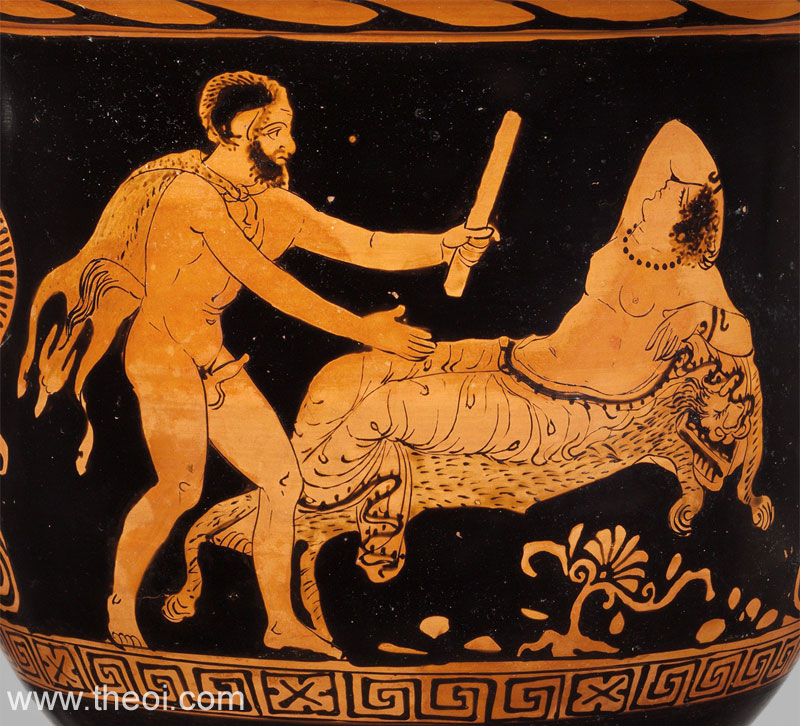
Homer, Odyssey 11. 260 ff (trans. Shewring) (Greek epic C8th B.C.) :
"[Odysseus saw the shades of heroines in the underworld :] I saw Antiope, the daughter of Asopos (Asopus); it was her pride to have slept in the arms of Zeus himself. She bore two sons, Amphion and Zethos (Zethus), primal founders of Thebes of the seven gates; they added walls to the spacious city because without them they could not hold it as their dwelling."
Hesiod, Catalogues of Women Fragment 95 (from Scholiast on Homer's Iliad 2. 469) (trans. Evelyn-White) (Greek epic C8th or 7th B.C.) :
"Or like her [Antiope] whom Boiotian Hyria nurtured as a maid."
[Cf. Apollodorus 3.10.1 below where Hyrieus, eponym of the town, is described as Antiope's grandfather.]
Euripides, Antiope (lost play) (Greek tragedy C5th B.C.) :
Euripides dramatized the story of Antiope in a play produced around 410 B.C. See Hyginus Fabulae 8 below for a summary of the plot.
Apollonius Rhodius, Argonautica 1. 735 ff (trans. Seaton) (Greek epic C3rd B.C.) :
"[Amongst the scenes embroidered on the cloak of Jason :] In it too were the twin sons of Antiope, daughter of Asopos, Amphion and Zethos."
Apollonius Rhodius, Argonautica 4. 1090 ff :
"For fathers are all too jealous against their children; what wrong did Nykteus (Nycteus) devise against Antiope, fair of face!"
Pseudo-Apollodorus, Bibliotheca 3. 5. 5 (trans. Frazer) (Greek mythographer C2nd A.D.) :
"Labdakos (Labdacus) [king of Thebes] having left a year-old son, Laios (Laeus), the government was usurped by Lykos (Lycus), brother of Nykteus (Nycteus), so long as Laios was a child. Both of them had fled [from Euboia] because they had killed Phlegyas, son of Ares and Dotis the Boiotian, and they took up their abode at Hyria, and thence having come to Thebes, they were enrolled as citizens through their friendship with Pentheus. So after being chosen commander-in-chief by the Thebans, Lykos compassed the supreme power and reigned for twenty years, but was murdered by Zethos (Zethus) and Amphion for the following reason. Antiope was a daughter of Nykteus, and Zeus had intercourse with her. When she was with child, and her father threatened her, she ran away to Epopeus at Sikyon (Sicyon) and was married to him. In a fit of despondency Nykteus killed himself, after charging Lykos to punish Epopeus and Antiope. Lykos marched against Sikyon (Sicyon), subdued it, slew Epopeus, and led Antiope away captive. On the way she gave birth to two sons at Eleurethai [on Mount Kithairon (Cithaeron)] in Boiotia (Boeotia). The infants were exposed, but a neatherd found and reared them, and he called the one Zethos and the other Amphion. Now Zethos paid attention to cattle-breeding, but Amphion practised minstrelsy, for Hermes had given him a lyre. But Lykos and his wife Dirke (Dirce) imprisoned Antiope and treated her despitefully. Howbeit, one day her bonds were loosed of themselves, and unknown to her keepers she came to her sons cottage, begging that they would take her in. They recognized their mother and slew Lykos, but Dirke they tied to a bull, and flung her dead body into the spring that is called Dirke after her. And having succeeded to the sovereignty they fortified the city, the stones following Amphion's lyre; and they expelled Laios."
Pseudo-Apollodorus, Bibliotheca 3. 10. 1 :
"Poseidon had intercourse with . . . [the Pleiad] Alkyone (Alcyone), who bore a daughter, Aithousa (Aethusa), the mother of Eleuther by Apollon, and two sons Hyrieus and Hyperenor. Hyrieus had Nykteus (Nycteus) and Lykos (Lycus) by a nymph Klonia (Clonia); and Nykteus had Antiope by Polyxo; and Antiope had Zethos and Amphion by Zeus."
Pausanias, Description of Greece 1. 38. 9 (trans. Jones) (Greek travelogue C2nd A.D.) :
"A little further on [past the town of Eleutherai on Mount Kithairon (Cithaeron)] is a small cave, and beside it is a spring of cold water. The legend about the cave is that Antiope after her labour placed her babies [i.e. Amphion and Zethos] into it; as to the spring, it is said that the shepherd who found the babies washed them there for the first time, taking off their swaddling clothes."
Pausanias, Description of Greece 2. 6. 1 - 4 :
"Korax (Corax) [king of Sikyon (Sicyon)] died without issue, and at about this time came Epopeus from Thessalia (Thessaly) and took the kingdom. In his reign the first hostile army is said to have invaded the land, which before this had enjoyed unbroken peace. The reason was this. Antiope, the daughter of Nykteus (Nycteus), had a name among the Greeks for beauty, and there was also a report that her father was not Nykteus but Asopos (Asopus), the river that separates the territories of Thebes and Plataia (Plataea).
This woman Epopeus carried off but I do not know whether he asked for her hand or adopted a bolder policy from the beginning. The Thebans came against him in arms, and in the battle Nykteus was wounded. Epopeus also was wounded, but won the day. Nykteus they carried back ill to Thebes, and when he was about to die he appointed to be regent of Thebes his brother Lykos (Lycus) for Labdakos (Labdacus), the son of Polydoros, the son of Kadmos (Cadmus), being still a child, was the ward of Nykteus, who on this occasion entrusted the office of guardian to Lykos. He also besought him to attack Aigialea [Sikyon] with a larger army and bring vengeance upon Epopeus; Antiope herself, if taken, was to be punished.
As to Epopeus, he forthwith offered sacrifice for his victory and began a temple of Athena, and when this was complete he prayed the goddess to make known whether the temple was finished to her liking, and after the prayer they say that olive oil flowed before the temple. Afterwards Epopeus also died of his wound, which he had neglected at first, so that Lykos had now no need to wage war. For Lamedon, the son of Koronos (Coronus), who became king after Epopeus, gave up Antiope. As she was being taken to Thebes by way of Eleutherai (Eleutherae), she was delivered there on the road.
Asios [Greek poet C7th B.C.] the son of Amphiptolemos says in his poem :--‘Zethos and Amphion had Antiope for their mother, daughter of Asopos, the swift, deep-eddying river, having conceived of Zeus and Epopeos, shepherd of peoples.’"
Pausanias, Description of Greece 2. 10. 4 :
"[In the town of Sikyon (Sicyon)] is another enclosure, sacred to Aphrodite. The first thing inside is a statue of Antiope. They say that her sons were Sikyonians, and because of them the Sikyonians will have it that Antiope herself is related to themselves."
Pausanias, Description of Greece 9. 17. 4 - 6 :
"[Near the city of Thebes :] The tomb shared by Zethos (Zethus) and Amphion is a small mound of earth. The inhabitants of Tithorea in Phokis like to steal earth from it when the sun is passing through the constellation Tauros. For if at that time they take earth from the mound and set it on Antiope's tomb, the land of Tithorea will yield a harvest, but that of Thebes be less fertile. For this reason the Thebans at that time keep watch over the tomb. Both these cities hold this belief, and they do so because of the oracles of Bakis (Bacis), in which are the lines :--‘But when a man of Tithorea to Amphion and to Zethos pours on the earth peace-offerings of libation and prayer, when Tauros is warmed by the might of the glorious sun, beware then of no slight disaster threatening the city; for the harvest wastes away in it, when they take of the earth, and bring it to the tomb of Phokos (Phocus).’
Bakis calls it the tomb of Phokos for the following reason. The wife of Lykos (Lycus) [i.e. Dirke (Dirce)] worshipped Dionysos more than any other deity. When she had suffered what the story says she suffered [at the hands of the sons of Antiope], Dionysos was angry with Antiope. For some reason extravagant punishments always arouse the resentment of the gods. They say that Antiope went mad, and when out of her wits roamed all over Greece; but Phokos [eponymous king of Phokis], son of Ornytion, son of Sisyphos, chanced to meet her, cured her madness, and then married her. So Antiope and Phokos share the same grave."
Pausanias, Description of Greece 9. 25. 3 :
"There is a river called Dirke (Dirce) [near Thebes] after the wife of Lykos (Lycus). The story goes that Antiope was ill-treated by this Dirke, and therefore the children of Antiope put Dirke to death."
Pausanias, Description of Greece 10. 32. 10 - 11 :
"[In the village of Tithorea in Phokis (Phocis) :] There is also the tomb of Antiope and Phokos (Phocus) [eponymous king of Phokis]. I have already in my account of Thebes mentioned how Antiope went mad because of the wrath of Dionysos, and the reason why she brought on herself the anger of the god; I have also told how Phokos, the son of Ornytion, fell in love with her, how she married him and is buried with him, and what Bakis (Bacis) the soothsayer says about this grave in common with that of Zethos and Amphion at Thebes."
Clement, Recognitions 10. 22 (trans. Smith) (Greek Christian rhetoric C2nd A.D.) :
"Vile Transformatoins of Jupiter [Zeus] . . . Amongst those whom we have mentioned [of the adulteries of Zeus], he violated some being transformed, like a magician. In short, he seduced Antiope, the daughter of Nycteus, when turned into a satyr, and of her were born Amphion and Zethus."
Pseudo-Hyginus, Fabulae 7 (trans. Grant) (Roman mythographer C2nd A.D.) :
"Antiopa, daughter of Nycteus, was by a trick violated by Epaphos [i.e. Epopeus king of Sicyon], and as a consequence was cast off by her husband Lycus. Thus widowed, Jupiter [Zeus] embraced her. But Lycus married Dirce. She, suspecting that her husband had secretly lain with Antiopa, ordered her servants to keep her bound in darkness. When her time was approaching, by the will of Jove [Zeus] she escaped from her chains to Mount Cithaeron, and when birth was imminent and she sought for a place to bear her child, pain compelled her to give birth at the very crossroads. Shepherds reared her sons as their own, and called one Zetos from [the Greek] ‘Seeking a Place’, and the other Amphion, because ‘She gave birth at the crossroads, or by the road.’ When the sons found out who their mother was, they put Dirce to death by binding her to an untamed bull; by the kindness of Liber [Dionysos], whose votary she was, on Mount Cithaeron a spring was formed from her body, which was called Dirce."
Pseudo-Hyginus, Fabulae 8 :
"Antiopa of Euripides (which Ennius wrote) : Antiopa was the daughter of Nycteus, king in Boeotia; entranced by her great beauty, Jupiter [Zeus] made her pregnant. When her father wished to punish her on account of her disgrace, and threatened harm, Antiopa fled. By chance Epaphus [i.e. Epopeus], a Sikyonian, was staying in the place to which she came, and he brought the woman to his house and married her. Nycteus took this hard, and as he was dying, bound by oath his brother Lycus, to whom he left his kingdom, not to leave Antiopa unpunished. After his death, Lycus same to Sicyon, and slaying Epaphus [Epopeus], brought Antiopa bound to Cithaeron. She bore sons, and left them there, but a shepherd reared them, naming them Zetus and Amphion. Antiopa had been given over to Dirce, Lycus' wife, for punishment. When opportunity presented itself, she fled, and came to her sons. But Zetus, thinking her a runaway, did not accept her. Dirce, in the revels of Liber [Dionysos], was brought to the same place. There she found Antiopa and was dragging her to death. But the youths, informed by the shepherd who had reared them that she was their mother, quickly pursued and rescued their mother, but slew Dirce, binding her by the hair to a bull. When they were about to kill Lycus, Mercurius [Hermes] forbade them, and at the same time ordered Lycus to yield the kingdom to Amphion."
Pseudo-Hyginus, Fabulae 155 :
"Sons of Jove [Zeus] . . . Zethus and Amphion, by Antiopa, daughter of Nycteus."
Ovid, Metamorphoses 6. 111 ff (trans. Melville) (Roman epic C1st B.C. to C1st A.D.) :
"Juppiter [Zeus] once in a Satyrus' guise had got Nycteis [Antiope, daughter of Nycteus] with twins."
Statius, Thebaid 7. 191 ff (trans. Mozley) (Roman epic C1st A.D.) :
"[Dionysos addresses Zeus :] ‘Here [in Boiotia] were those nights of Hercules' begetting, and the favoured flame of wandering Nycteis [i.e. Antiope daughter of Nycteus].’"
Nonnus, Dionysiaca 7. 110 ff (trans. Rouse) (Greek epic C5th A.D.) :
"Eros (Love) . . . took out the divine quiver, in which were kept apart twelve firefed arrows for Zeus, when his desire turned towards one or another of mortal women for a bride. Right on the back of his quiver of lovebolts he had engraved with letters of gold a sentence in verse for each. On the back of his quiver of lovebolts he [the god Eros] had engraved with letters of gold a sentence in verse for each:--
The first takes Kronion (Cronion) to the bend of heifer-fronted Io.
The second shall Europa woo for the bold bull abducting.
The third to Plouto's (Pluto's) bridal brings the lord of high Olympos.
The fourth shall call to Danaë a golden bed-companion.
The fifth shall offer Semele a burning fiery wedding.
The sixth shall bring the King of heaven an eagle to Aigina (Aegina).
The seventh joins Antiope to a pretended Satyros (Satyr)."
Nonnus, Dionysiaca 16. 240 ff :
"You have heard of love's game of trickery for Antiope, the laughing Satyros (Satyr), the sham of a deceitful mate."
Nonnus, Dionysiaca 33. 301 ff :
"Zeus the Ruler on High once took the shape of a Satyros (Satyr), and wooed he maiden Antiope under a deceitful shape, in the mock love of a dancing bridal."
ANCIENT GREEK & ROMAN ART
SOURCES
GREEK
- Homer, The Odyssey - Greek Epic C8th B.C.
- Hesiod, Catalogues of Women Fragments - Greek Epic C8th - 7th B.C.
- Apollodorus, The Library - Greek Mythography C2nd A.D.
- Apollonius Rhodius, The Argonautica - Greek Epic C3rd B.C.
- Diodorus Siculus, The Library of History - Greek History C1st B.C.
- Pausanias, Description of Greece - Greek Travelogue C2nd A.D.
- Clement, Recognitions - Christian Scholar C2nd A.D.
- Nonnus, Dionysiaca - Greek Epic C5th A.D.
ROMAN
- Hyginus, Fabulae - Latin Mythography C2nd A.D.
- Ovid, Metamorphoses - Latin Epic C1st B.C. - C1st A.D.
- Statius, Thebaid - Latin Epic C1st A.D.
OTHER SOURCES
Other references not currently quoted here : Malalas Chr. 2. 45-49, Scholiast on Ap. Rhod.Argon. iv.1090, Nicolaus Damascenus frag. 11, First Vatican Mythographer 97, Second Vatican Mythographer 74.
BIBLIOGRAPHY
A complete bibliography of the translations quoted on this page.
